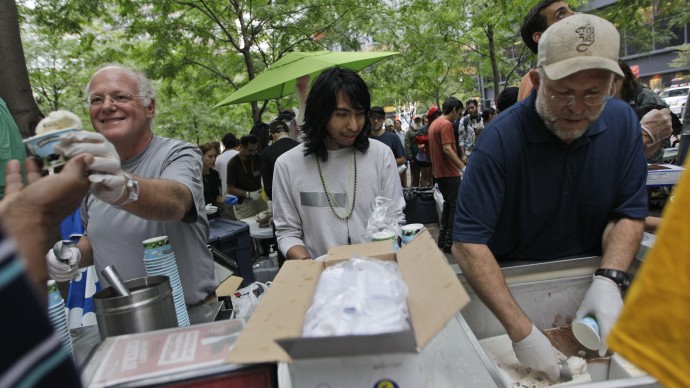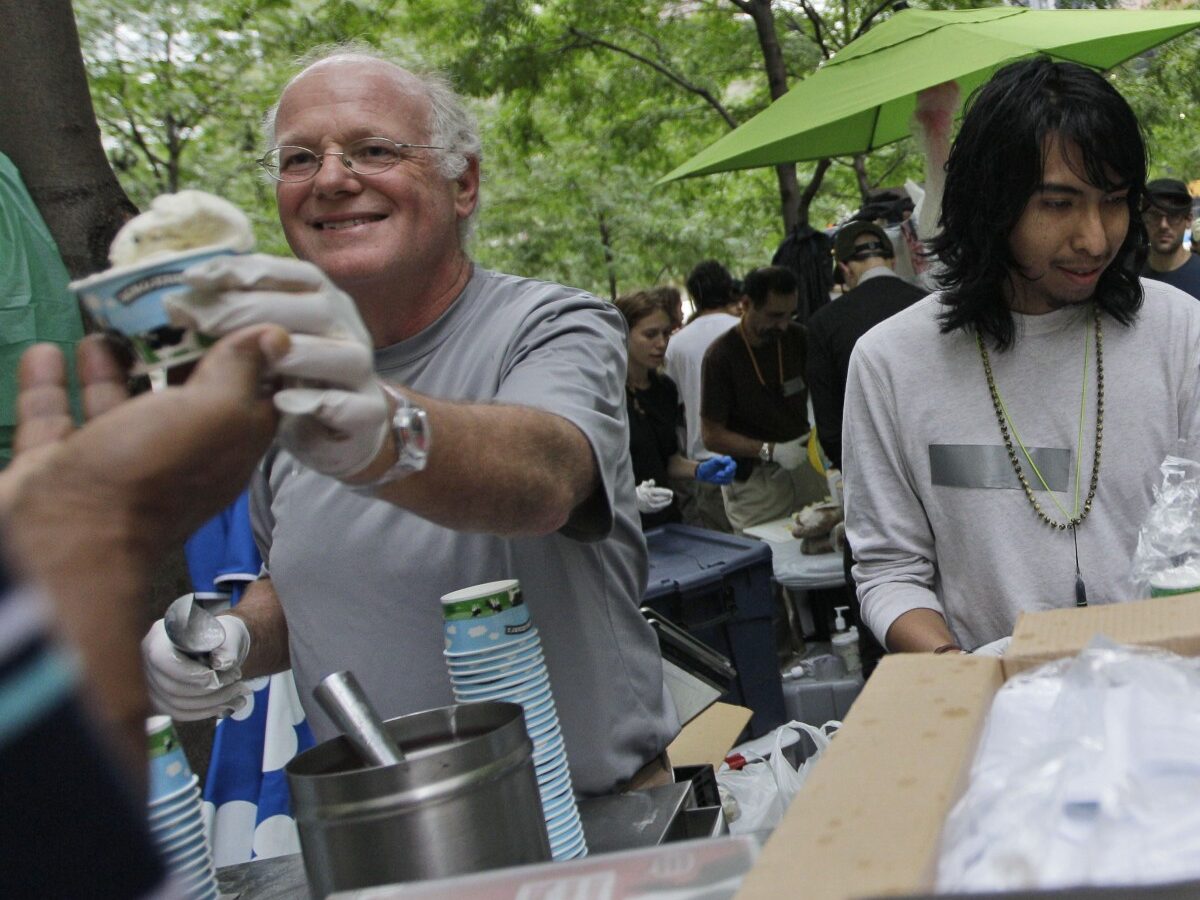
(Mint Press)– Ben and Jerry’s co-founder Ben Cohen, an outspoken supporter of the Occupy Movement, recently announced his support for a stamp U.S. currency initiative. The stamps are part of a part of a growing American democracy movement which seeks to purge electoral politics of money coming from corporations and special interests, attracting activist groups from both the left and right, including Occupy, the 99 Percent Declaration, Move to Amend and certain contingents within the Tea Party movement.
The rubber stamps, while funded entirely by Cohen, are supported by more than 200,000 grassroots activists who have signed the Move to Amend online petition. Seeking to create a constitutional amendment, the group of activists are committed unequivocally to two important points: corporations are not people and money is not a form of free speech.
Move to Amend
Cohen, an entrepreneur and former owner of the Vermont-based ice cream company, has consistently opposed the notion that corporations have the same rights as people. In November 2011, during the nascent stages of the Occupy Movement, Cohen offered the succinct statement, “Everyone knows corporations are not people. Ben is a person. Jerry is a person. Ben & Jerry’s is not a person.”
The Ben and Jerry’s Corporation was sold to the Anglo-Dutch multinational corporation Unilever in 2000 for $326 million. During their tenure as CEOs, the lifelong friends created a model of corporate responsibility, requiring that no employee’s salary can exceed seven times that of an entry level employee. Now retired from day-to-day operations in the company, Ben Cohen has partnered with citizen groups, like Move to Amend, for various political causes.
Move to Amend, a grassroots citizen activist group working to create broad campaign finance reform, brings together like-minded citizens. David Cobb, spokesman for the group, emphasized that the movement is a broad coalition, bringing together a multi-racial, multi-ethnic group of people from across the political spectrum, all of whom are committed to reforming current campaign finance laws.
Although the 2010 Citizens United Supreme Court Decision was a “flashpoint”, according to Cobb, “The system was already awash in special interest money long before Citizen’s United,” Cobb noted in a recent statement to MintPress. For example, the 1976 Supreme Court case Buckley v. Valeo determined that spending money on a political campaign was a form of protected free speech.
This decision and others has led to what activists are calling “runaway campaign spending” with corporations, unions and wealthy donors flooding congressional and presidential campaigns. Sen. Bernie Sanders, (I-VT), an outspoken supporter of a constitutional amendment, has commented on the issue previously saying, “The goal right now is to make sure that Wall Street and coal companies and oil companies and other for-profit corporations cannot go into their billion-dollar treasuries, take that money out and spend as much money as they want.” The Move to Amend Spokesman stressed that although this issue is often associated with Occupy, the group is a diverse effort with strong support from conservatives and tea party members.
“We are calling for an amendment to the U.S. Constitution to unequivocally state that inalienable rights belong to human beings only, and that money is not a form of protected free speech under the First Amendment and can be regulated in political campaigns,” Cobb added.
Currency stamping
This summer, the one of a kind stamping device, compared to a “Rube Goldberg” contraption, will be hauled on a flatbed trailer around the country to various Occupy and Move to Amend events. Activists will have the opportunity to stamp their currency with phrases, “Future property of the one Percent,” and pie charts showing the skewed distribution of wealth in the United States.
According to the project website, occupygeorge.com, the wealthiest 400 Americans have as much wealth as the bottom 150 million wage earners, approximately half the United States population. Smaller rubber stamps will be available for citizens to take home to continue the project.
While there is some concern that the stamps could be considered illegal defacement of U.S. currency, Cobb, a lawyer, has researched the issue, confident that the project is legally permissible. Previously, the “Where’s George? currency tracking project, stamped one dollar bills and allowed citizens to go online to register the movement of bills across the U.S.
While the issue of campaign finance is often associated with more liberal groups like Occupy Wall Street, Move to Amend boasts a strong multi-partisan representation from Americans who wish to remove the corrupting influence of big money in politics.
“We are literally able to bring together the basic critique of Occupy and the basic critique of the Tea Party. There is a recognition that Wall Street and the big bankers dominate party politics in Washington. We are uniting people under the idea of a creating a true democratic republic,” Said Cobb in a recent MintPress statement.
Common goals but separate movements
The Occupy Wall Street movement plans to create a national gathering in Philadelphia, Penn. June 30-July 4. More than 61 occupations from around the U.S. have supported the action which is expected to bring thousands of activists to the East Coast city. Since the beginning of the Occupy demonstrations in the fall of 2011, critics have labeled the Occupy Movement as nebulous and lacking a clear direction or cause. The national meeting, while expected to produce many of the well known direct actions, is also designed to allay concerns by helping activists work together in crafting a more unified message.
On July 5, at the conclusion of the meeting, activists plan to march 99 miles from Independence Mall in Philadelphia to Wall Street in New York City. The march has been organized by musician Tom Morello’s Guitarmy, previously involved in the Chicago NATO protests last month.
At the conclusion of the Occupy national meetup, the 99 percent Declaration will be holding the Continental Congress 2.0, a meeting of activists to deliberate, draft and ratify a petition grievances. Much like Move to Amend, the Continental Congress 2.0 decries the evils of corporate personhood and has issued a call to overturn the Citizens United decision.
The closed meeting will bring together one man and one woman from each of the 435 Congressional districts. Voting to decide the 878 delegates was conducted online and closed on May 25. The delegates plan to meet and draft a set of grievances that will be read on July 4, 2012 and then delivered to all 535 members of Congress, the Supreme Court and the president of the United States.
While there is significant overlap in the platform of the Occupy Movement and the 99 Percent Declaration, a recent press release made clear that the two are separate unaffiliated groups.
“The national convention of delegates on July 2nd in Philadelphia, Pennsylvania is a product of the 99% Declaration affinity group and does not have the endorsement of the Occupy Movement. The 99D project employs methods that the Movement has found disconcerting including representative governance, closed meetings, and exclusionary tactics. Our Movement is committed to the principles of direct democracy, transparency, and horizontalism and we cannot endorse a convention that does not adhere to these principles.”
This echoes an earlier rejection of the 99 percent declaration, when in February, Occupy Philadelphia voted against the declaration. In a strongly worded resolution, Occupy Philadelphia declared, “We do not support the 99% Declaration, its group, its website, its National GA and anything else associated with it.”


